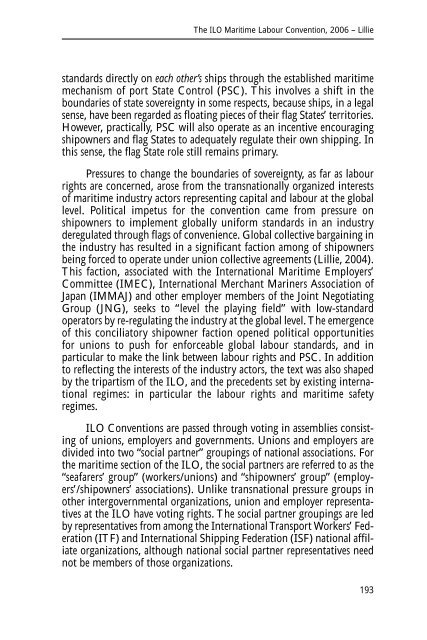CROSS-BORDER SOCIAL DIALOGUE AND AGREEMENTS: An ...
CROSS-BORDER SOCIAL DIALOGUE AND AGREEMENTS: An ...
CROSS-BORDER SOCIAL DIALOGUE AND AGREEMENTS: An ...
Create successful ePaper yourself
Turn your PDF publications into a flip-book with our unique Google optimized e-Paper software.
The ILO Maritime Labour Convention, 2006 – Lillie<br />
standards directly on each other’s ships through the established maritime<br />
mechanism of port State Control (PSC). This involves a shift in the<br />
boundaries of state sovereignty in some respects, because ships, in a legal<br />
sense, have been regarded as floating pieces of their flag States’ territories.<br />
However, practically, PSC will also operate as an incentive encouraging<br />
shipowners and flag States to adequately regulate their own shipping. In<br />
this sense, the flag State role still remains primary.<br />
Pressures to change the boundaries of sovereignty, as far as labour<br />
rights are concerned, arose from the transnationally organized interests<br />
of maritime industry actors representing capital and labour at the global<br />
level. Political impetus for the convention came from pressure on<br />
shipowners to implement globally uniform standards in an industry<br />
deregulated through flags of convenience. Global collective bargaining in<br />
the industry has resulted in a significant faction among of shipowners<br />
being forced to operate under union collective agreements (Lillie, 2004).<br />
This faction, associated with the International Maritime Employers’<br />
Committee (IMEC), International Merchant Mariners Association of<br />
Japan (IMMAJ) and other employer members of the Joint Negotiating<br />
Group (JNG), seeks to “level the playing field” with low-standard<br />
operators by re-regulating the industry at the global level. The emergence<br />
of this conciliatory shipowner faction opened political opportunities<br />
for unions to push for enforceable global labour standards, and in<br />
particular to make the link between labour rights and PSC. In addition<br />
to reflecting the interests of the industry actors, the text was also shaped<br />
by the tripartism of the ILO, and the precedents set by existing international<br />
regimes: in particular the labour rights and maritime safety<br />
regimes.<br />
ILO Conventions are passed through voting in assemblies consisting<br />
of unions, employers and governments. Unions and employers are<br />
divided into two “social partner” groupings of national associations. For<br />
the maritime section of the ILO, the social partners are referred to as the<br />
“seafarers’ group” (workers/unions) and “shipowners’ group” (employers’/shipowners’<br />
associations). Unlike transnational pressure groups in<br />
other intergovernmental organizations, union and employer representatives<br />
at the ILO have voting rights. The social partner groupings are led<br />
by representatives from among the International Transport Workers’ Federation<br />
(ITF) and International Shipping Federation (ISF) national affiliate<br />
organizations, although national social partner representatives need<br />
not be members of those organizations.<br />
193
















